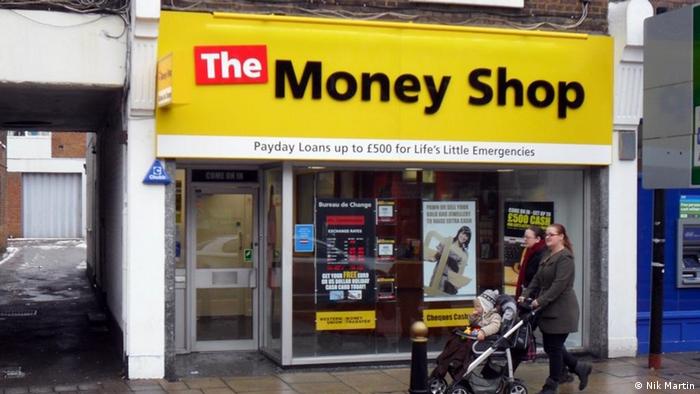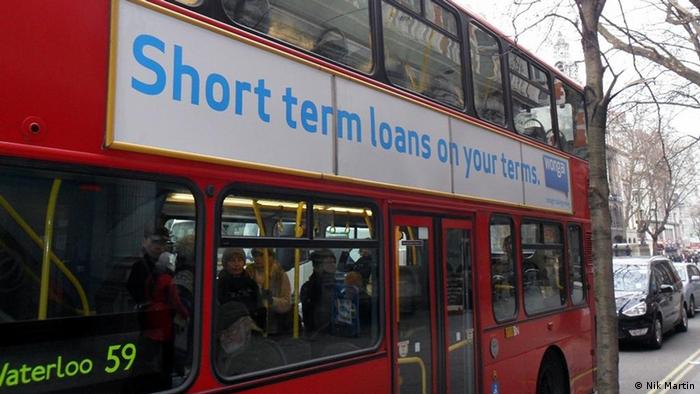Wiring for Help at Cable & Wireless
***

Charities in the UK are warning of a personal debt crisis, as many in Britain take out "payday" loans to pay their bills. High interest rates are turning small debts into large debts in a hurry.
UK charities are warning of a growing personal debt crisis as thousands of Britons resort to short-term, high-interest loans to pay their bills. So-called "payday loans" aren't just being used for "life's little emergencies," like urgent car repairs or a child's winter coat.
New figures suggest that as many as seven million people in the UK have used such loans in the last 12 months - and they need the money to cover basic expenses, like paying for housing.
Payday loans are short-term lending facilities often for just a few days. Interest rates are kept high to encourage quick repayment. But unlike a generation ago when check-cashing services would advance consumers up to £50 (62 euros) until the end of the month, these days the stakes are higher. Payday lending starts at around £500 or £1000.
Mortgage arrears
According to the homeless charity Shelter, almost a million people use payday loans as the way to pay their mortgage or rent. After all, banks and card companies reduced credit and overdraft limits in the wake of the 2008 financial crisis. That firmly put an end to a decade-long binge of cheap - often interest-free - debt.
With no signs of a quick turnaround in the fortunes of the British economy or in the short-term health of some of its banks, payday loans are increasingly the only option for many consumers.
“There's been rent rises, pay freezes, people are potentially at risk of losing their jobs, the number of people out of work is going up,” said Belinda Turffrey from Shelter.
The charity's campaigns manager added: “People are generally finding it more and more difficult to keep their head above water. And as soon as they get into this situation, the spiral can start quite quickly,” she said, pointing to figures that suggest that one loan is not always enough.

'Dubious' tactics
If a consumer takes out an advance to cover a short-term cashflow problem and then returns unable to pay the first loan, “they'll often happily give you more cash," says Paul Crayston from the Money Advice Trust.
Crayston, whose charity offers free debt advice hotline, told Deutsche Welle: “You'll often be encouraged by the lender to take out a second payday loan. "They'll say: 'Don't worry, we appreciate your problem, pay us back at the end of next month.'"
“By the end of three or four months, you are in a position where you have taken out five or six payday loans and you end up paying thousands of pounds in interest.”
Preying on the poor
Those from poorer socio-economic backgrounds are more likely to take out payday loans. Campaigners say they often have a poor credit history and traditional lenders won't touch them.
But the rise in middle-class borrowers whose income won't cover the monthly mortgage has got many charities worried that many personal finances are on an unsustainable path.

Money Advice Trust says it gets up to 200 calls a month about payday loans
Around 18 months ago, the Money Advice Trust was receiving around 150-200 calls per month about payday loans. Crayston told us: “Now we're receiving between 1000 and 2000 calls a month, so the growth is exponential. There's really nothing growing at this sort of rate in the consumer credit market.”
Annual interest rates are as high as 4,000 percent and many promise the money will be in a borrower's bank account within minutes. Britain's Daily Mail newspaper recently reported how some borrowers ended up receiving demands for the equivalent of 15,000 percent when their finances hit the skids.
Quick cash
The lenders say their loans are not meant to provide long-term credit solutions.
One of the largest, wonga.com - named after a British slang word for money - said that they're completely transparent with customers about interest rates and any penalties for late payment.
Payday lenders expect the number of UK customers to reach 3.5 million in 2012, up from 2 million last year.
And while charities despair at their lending tactics, they concede that there is still a huge demand for access to emergency cash.
“Nobody chooses a payday loan, or very few people choose a payday loan,” said Paul Crayston from the Money Advice Trust. “Its normally their only option to save them from some form of financial difficulty.”
Tighter regulation?
While politicians say it'll be impossible to ban them, they do point to growing support to prevent payday lenders from advertising so predominantly.
A dozen British lawmakers are supporting a backbench bill to ban their commercials from TV and radio, which will be heard in parliament in next month.
But charities say consumers need to know that using payday loans for housing is totally untenable.
They expect thousands more in Britain to end up homeless when their payday loans snowball, leading to repossession or eviction.
Author: Nik Martin / ji
Editor: Gabriel Borrud
沒有留言:
張貼留言